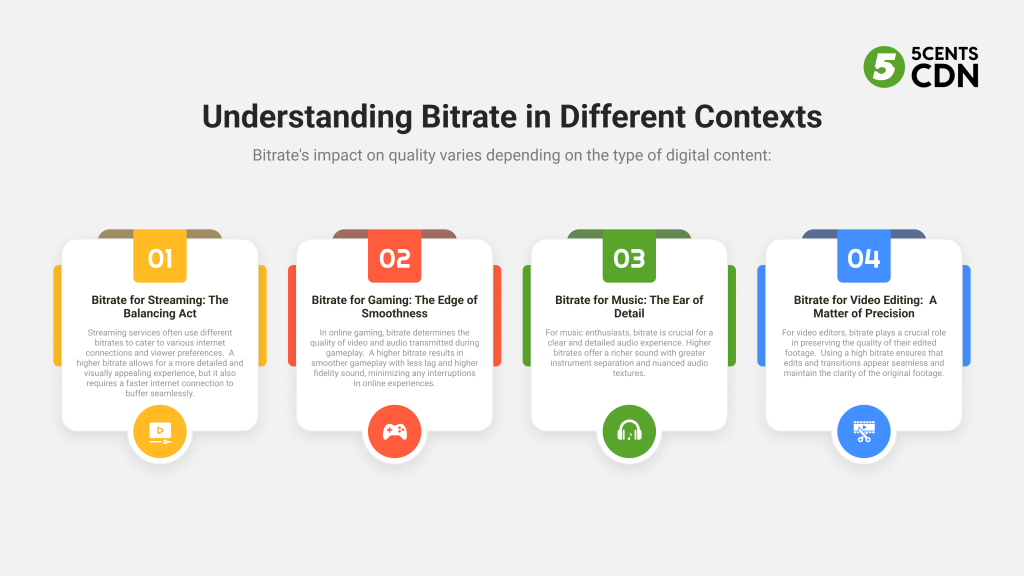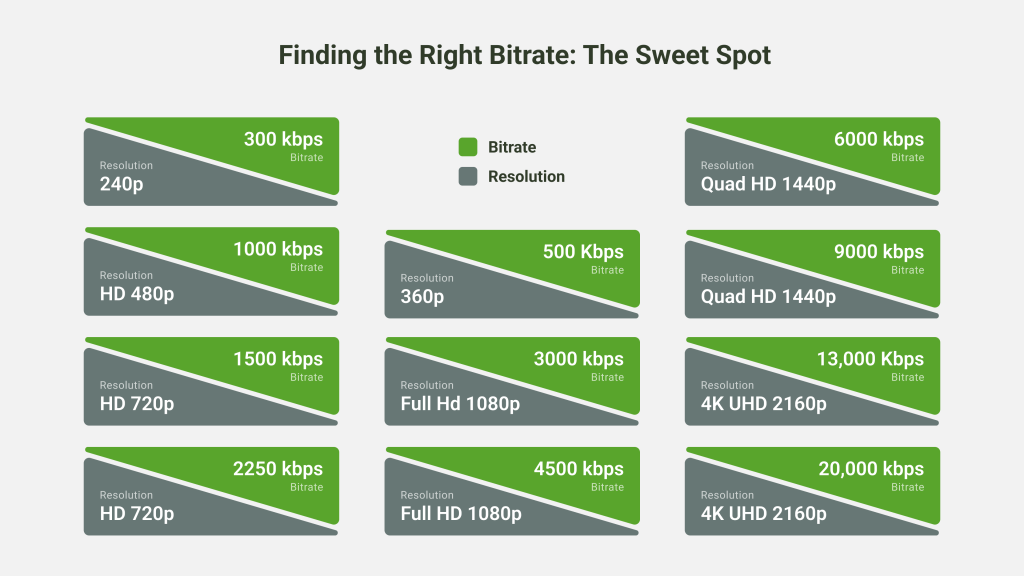Have you ever wondered why some videos look crystal clear while others appear pixelated and blurry? Or why some music tracks sound rich and detailed while others lack depth? The answer lies in a term called bitrate, a crucial factor in determining the quality of your digital media. So, what is bitrate exactly, and why should you care?
In simple terms, bitrate refers to the amount of data transmitted per second for a digital file. The higher the bitrate, the more data is transferred per second, resulting in a larger file size but also a higher quality experience. Conversely, a lower bitrate means less data is transferred per second, resulting in a smaller file size but potentially lower quality.
What is Bitrate? A Deeper Dive

Bitrate, in essence, is the amount of data processed per second during the transmission or playback of digital content. It’s the digital equivalent of water flowing through a pipe – the higher the bitrate, the more information (or water) can flow through in a given time. What is bitrate’s significance? It determines how much information is packed into every second of your digital content, directly affecting the quality of your audio and video.
Bitrate: Beyond Just a Number
Bitrate is measured in bits per second (bps). While this might sound technical, it essentially signifies how much information is packed into every second of your digital content. Think of it like this:
High bitrate: Imagine a detailed blueprint with every intricate detail meticulously drawn. This equates to a high-quality audio or video experience with rich colors, sharp images, and crisp sound.
Low bitrate: Imagine a simple sketch with only basic outlines. This represents a lower-quality experience with muted colors, grainy images, and potentially distorted sound.
Bitrate vs. Resolution: A Common Misconception

Many people confuse bitrate with resolution. While both contribute to visual quality, they operate differently:
Resolution: Determines the number of pixels that make up an image. Think of it as the size of the canvas on which your digital image is painted. A higher resolution means more pixels, resulting in a sharper, more detailed image.
Bitrate: Determines the amount of data used to represent each pixel. It’s like the quality of the paint used on the canvas. Higher bitrate translates to more nuanced colors and smoother transitions, even at the same resolution.
Understanding Bitrate in Different Contexts

Bitrate’s impact on quality varies depending on the type of digital content:
1. What is Bitrate’s Role in Streaming? The Balancing Act
Streaming services often use different bitrates to cater to various internet connections and viewer preferences. A higher bitrate allows for a more detailed and visually appealing experience, but it also requires a faster internet connection to buffer seamlessly.
Here’s what to keep in mind:
- Lower bitrates: Good for slower internet connections but might result in a slightly less detailed image.
- Higher bitrates: Offer a more visually stunning experience but require a robust internet connection to avoid buffering issues.
2. What is Bitrate’s Impact on Gaming? The Edge of Smoothness
In online gaming, bitrate determines the quality of video and audio transmitted during gameplay. A higher bitrate results in smoother gameplay with less lag and higher fidelity sound, minimizing any interruptions in online experiences.
Consider this:
- Lower bitrates: Can lead to lag, stuttering, and distorted audio during gameplay.
- Higher bitrates: Ensure smooth gameplay and high-quality audio even during intense gaming sessions.
3. What is Bitrate for Music? The Ear of Detail
For music enthusiasts, bitrate is crucial for a clear and detailed audio experience. Higher bitrates offer a richer sound with greater instrument separation and nuanced audio textures.
Think about this:
- Lower bitrates: Might sound compressed and lack depth, with less detail in the music.
- Higher bitrates: Provide a wider dynamic range, revealing subtler nuances and enriching the overall listening experience.
4. What is Bitrate in Video Editing? A Matter of Precision
For video editors, bitrate plays a crucial role in preserving the quality of their edited footage. Using a high bitrate ensures that edits and transitions appear seamless and maintain the clarity of the original footage.
Here’s what you need to know:
- Lower bitrates: Can lead to visible compression artifacts, making edits appear less sharp and introducing unwanted noise.
- Higher bitrates: Preserve the details of the video and minimize compression artifacts, resulting in a cleaner and more professional-looking final product.
How Does Bitrate Affect Internet Speed?
Mbps: Megabits per Second: Internet speed is typically measured in Mbps (megabits per second). This number refers to the bitrate of your internet connection, indicating how much data can be transferred per second.
Bitrate vs Speed: Higher bitrates lead to faster download and upload speeds, resulting in a smoother and more responsive online experience. However, the actual speed you experience also depends on factors like network congestion and server performance.
Streaming Buffer: A high bitrate internet connection helps prevent buffering issues while streaming video and audio. This is because more data can be downloaded per second, ensuring a smooth and uninterrupted playback experience.
Finding the Right Bitrate: The Sweet Spot

The optimal bitrate for your specific use case depends on factors like your internet speed, storage capacity, and desired level of quality. Experiment with different bitrates and find the sweet spot that provides the best balance between quality and file size.
Remember: A higher bitrate isn’t always better. It’s crucial to find the right balance for your specific needs and ensure that the bitrate is compatible with your system and internet connection.
Conclusion: Bitrate Matters
Understanding what bitrate is empowers you to make informed decisions about your digital media. Whether you’re streaming videos, playing games, listening to music, or editing videos, choosing the right bitrate ensures an optimal experience without sacrificing quality or straining your internet connection. So next time you’re downloading a file or adjusting streaming settings, remember the importance of bitrate and find that sweet spot that suits your needs perfectly.